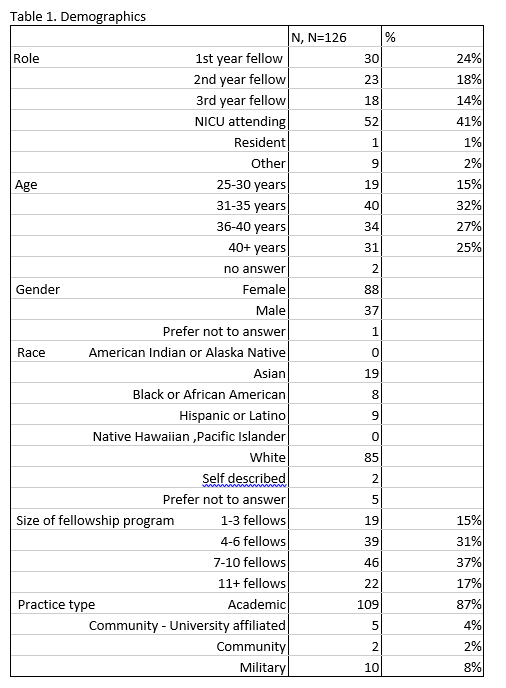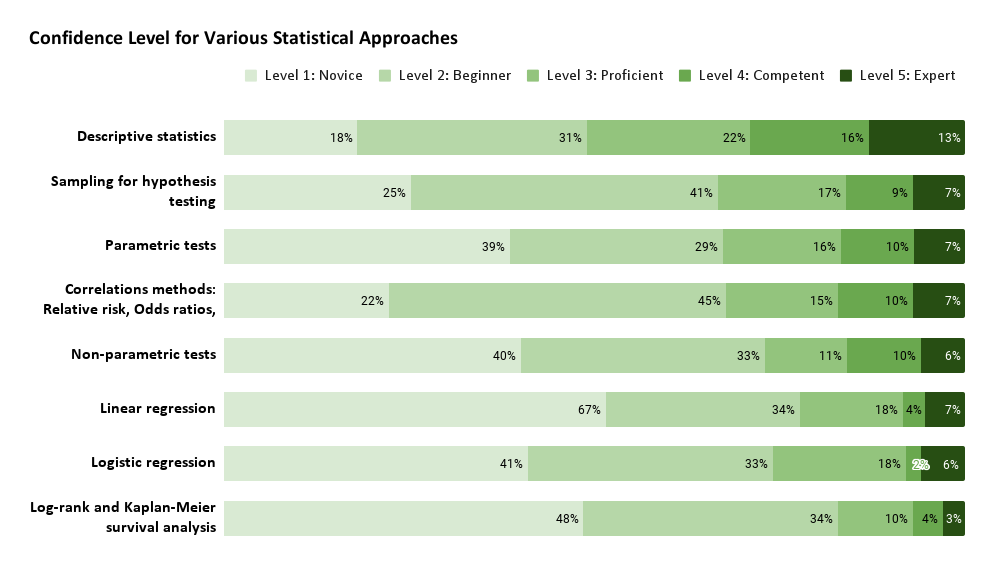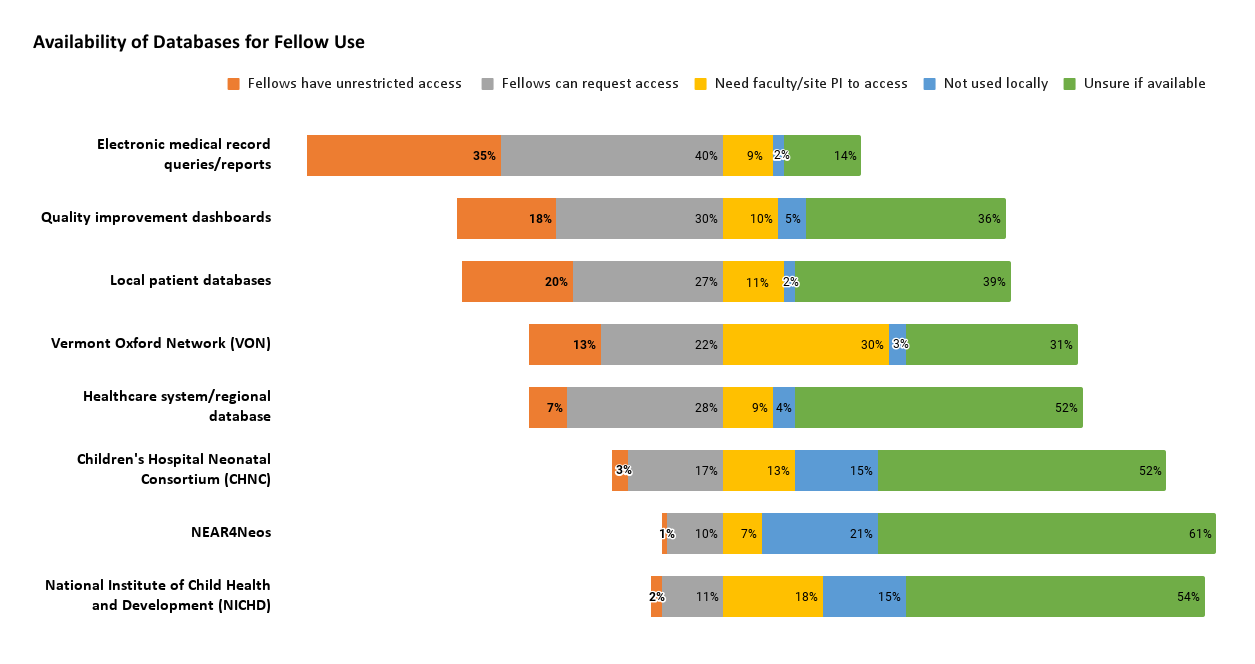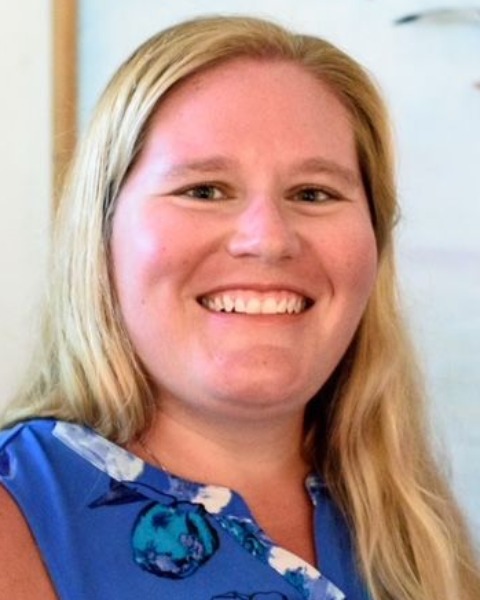Back
Background: Core knowledge in Scholarly Activity accounts for 5% of the questions in the American Board of Pediatrics (ABP) Neonatal-Perinatal Medicine (NPM) initial certifying exam, which largely includes the principles of use of biostatistics in research. A strong foundation of knowledge in hypothesis-driven research and understanding of statistical methods is vital for future career scholarship activities. The quantity and quality of biostatistics training for fellows varies in all fellowship programs. The differences can be attributed to availability of content experts and resources in each program.
Objective: To assess knowledge gaps in teaching biostatistics among NPM fellows and faculty participating in the National Neonatology Curriculum (NNC) to facilitate specific education interventions.
Design/Methods: RedCap survey link was sent out via email to neonatal fellows and faculty via the Organization of Neonatal Training Program Directors (ONTPD) and Trainee and Early Career Neonatologists (TECAN) listserv. Survey participation was voluntary and included questions about demographics, statistical experience, confidence, and barriers to statistical education. The survey was approved by the Institutional Review Board of the University of Vermont as exempt. Data analysis was performed with Stata.
Results: There were 126 responders to the survey (Table 1). Sixty-seven respondents (53%) reported statistics training in medical school, 59 (47%) reported training in residency, and 65 (52%) reported training in fellowship. Only two respondents had never had biostatistics training. Fifty-four (44%) respondents felt that the statistical training in their fellowship was inadequate and did not meet their needs, while another 39 (32%) felt their statistical training was just adequate to meet needs. Only 12 (10%) respondents felt they had enough training to prepare for their future career. Confidence level for statistical approaches was low for the majority of responders (Figure 1). Difficulties included learning about statistics, finding resources, using statistical programs, and applying statistical knowledge to journals and reviews. Access to databases to apply statistical skills was variable, with many fellows unaware or unable to access meaningful databases (Figure 2).
Conclusion(s): There is a clear need for an effective curriculum in biostatistics for neonatal fellows. Neonatal fellows do not feel they have adequate training for their future career in Neonatology. The majority of respondents expressed a desire to learn more about statistics for current and future work.



Medical Education: Fellow
Medical Education 3: Fellow 1
487 - Needs Assessment for the Development of a National Neonatology Biostatistics Curriculum
Friday, April 28, 2023
5:15 PM – 7:15 PM ET
Poster Number: 487
Publication Number: 487.124
Publication Number: 487.124
Nicole Lock, University of Virginia School of Medicine, Charlottesville, VA, United States; Jeanne Krick, Brooke Army Medical Center, San Antonio, TX, United States; Megan Gray, University of Washington School of Medicine, Seattle, WA, United States; Deirdre O'Reilly, The University of Vermont Children's Hospital, Burlington, VT, United States; Margarita Vasquez, The University of Texas Health Science Center at San Antonio Joe R. and Teresa Lozano Long School of Medicine, San Antonio, TX, United States

Nicole Lock, DO (she/her/hers)
Neonatal-Perinatal Fellow
University of Virginia School of Medicine
Charlottesville, Virginia, United States
Presenting Author(s)
Background: Core knowledge in Scholarly Activity accounts for 5% of the questions in the American Board of Pediatrics (ABP) Neonatal-Perinatal Medicine (NPM) initial certifying exam, which largely includes the principles of use of biostatistics in research. A strong foundation of knowledge in hypothesis-driven research and understanding of statistical methods is vital for future career scholarship activities. The quantity and quality of biostatistics training for fellows varies in all fellowship programs. The differences can be attributed to availability of content experts and resources in each program.
Objective: To assess knowledge gaps in teaching biostatistics among NPM fellows and faculty participating in the National Neonatology Curriculum (NNC) to facilitate specific education interventions.
Design/Methods: RedCap survey link was sent out via email to neonatal fellows and faculty via the Organization of Neonatal Training Program Directors (ONTPD) and Trainee and Early Career Neonatologists (TECAN) listserv. Survey participation was voluntary and included questions about demographics, statistical experience, confidence, and barriers to statistical education. The survey was approved by the Institutional Review Board of the University of Vermont as exempt. Data analysis was performed with Stata.
Results: There were 126 responders to the survey (Table 1). Sixty-seven respondents (53%) reported statistics training in medical school, 59 (47%) reported training in residency, and 65 (52%) reported training in fellowship. Only two respondents had never had biostatistics training. Fifty-four (44%) respondents felt that the statistical training in their fellowship was inadequate and did not meet their needs, while another 39 (32%) felt their statistical training was just adequate to meet needs. Only 12 (10%) respondents felt they had enough training to prepare for their future career. Confidence level for statistical approaches was low for the majority of responders (Figure 1). Difficulties included learning about statistics, finding resources, using statistical programs, and applying statistical knowledge to journals and reviews. Access to databases to apply statistical skills was variable, with many fellows unaware or unable to access meaningful databases (Figure 2).
Conclusion(s): There is a clear need for an effective curriculum in biostatistics for neonatal fellows. Neonatal fellows do not feel they have adequate training for their future career in Neonatology. The majority of respondents expressed a desire to learn more about statistics for current and future work.



